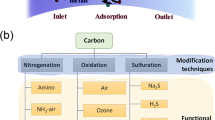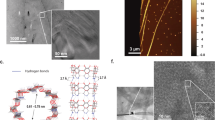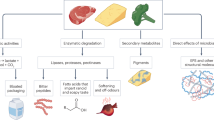Abstract
A FEW years ago, Dr. A. J. P. Martin and his colleagues at the Wool Industries Research Association1 developed a technique using solvent extraction on absorbent paper for the separation and detection of mixtures of amino-acids. This process, which the discoverers termed ‘partition chromatography', has more recently been applied to other problems, for example, the separation and identification of amino-acids derived from human metabolism2, and to the analytical study of different varieties of penicillin in mixtures3.
This is a preview of subscription content, access via your institution
Access options
Subscribe to this journal
Receive 51 print issues and online access
$199.00 per year
only $3.90 per issue
Buy this article
- Purchase on Springer Link
- Instant access to full article PDF
Prices may be subject to local taxes which are calculated during checkout
Similar content being viewed by others
References
Gordon, A. H., Martin, A. J. P., and Synge, R. L. M., Biochem. J., 37 (1), 79 (1943). Consden, R., Martin, A. J. P., and Gordon, A. H., ibid., 38 (3), 224 (1944).
Dent, C. E., Lancet, 251, 637 (1946).
Goodall, R. R., and Levi, A. A., Nature, 138, 675 (1946).
Author information
Authors and Affiliations
Rights and permissions
About this article
Cite this article
ARDEN, T., BURSTALL, F., DAVIES, G. et al. A New Method for the Separation, Detection and Estimation of Inorganic Compounds. Nature 162, 691–692 (1948). https://doi.org/10.1038/162691a0
Issue Date:
DOI: https://doi.org/10.1038/162691a0
This article is cited by
-
Dipolar aprotic solvents in paper chromatography of inorganic substances
Chromatographia (1972)
-
Thin layer chromatographic separation of gallium, indium, thallium, zinc and cadmium as their diethyldithiocarbamate complexes
Chromatographia (1970)
-
Paper chromatography of metal ions in solvents containing methylamine
Fresenius' Zeitschrift für analytische Chemie (1967)
Comments
By submitting a comment you agree to abide by our Terms and Community Guidelines. If you find something abusive or that does not comply with our terms or guidelines please flag it as inappropriate.



